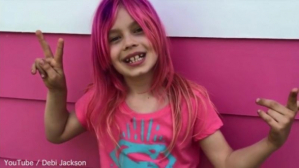The number of children referred to "gender identity clinics" has quadrupled in the past five years, statistics have revealed, causing one expert to warn transgender issues are being "over-promoted" in schools and that children are being forced to "un-learn" the differences between boys and girls.
Statistics from the Gender Identity Development Service (GIDS) reveal that 84 children aged between three and seven were referred to gender identity clinics last year, compared to just 20 in the year of 2012 to 2013.
Results have shown that the number of children under the age of ten being referred to service had also risen by four times in the last five years: a total of 165 children aged ten and under were referred to the clinic last year, compared with 36 in the year of 2012 to 2013.
Last year, 2,016 young people aged between three and 18 attended gender identity clinics, while just 314 did from 2012 to 2013.
Dr. Joanna Williams, author of Women vs Feminism, told the Telegraph that the results suggest that transgender issues are being "over-promoted" in schools.
"Children - encouraged by their experiences at school - are beginning to question their gender identity at ever younger ages," she said.
Williams warned that teaching children about transgender issues could be "sowing seeds of confusion" in the minds of children and teens, leading to more seeking gender identity therapies.
"In doing more than just supporting transgender children, and instead sowing confusion about gender identity, schools do neither boys nor girls any favors," she said, adding that recent changes to school policies could be forcing children to "unlearn" the difference between boys and girls.
According to the MailOnline, children are referred to GIDS by either their doctor or childhood mental health services. Those referred are assessed for six months by a clinician, which is followed by an action plan involving counseling and, in certain cases, physical intervention.
Children who have started puberty can be prescribed a course of hormone blockers to suppress the changes associated with adult development, and those 16 and older can be given "cross-sex hormones, giving them the physical characteristics of the opposite sex."

Chris McGovern, a former advisor to the Department for Education, said: "It has become an industry, people are making a career out of encouraging children to question gender at an age when they need to be left to be children. When teachers raise these issues children can become confused or unhappy and traumatized by it."
He added: "In a sense we are imposing adult concerns on children. Schools feel under huge pressures to comply with a politically correct agenda."
In a recent op-ed, Michelle Cretella, M.D., president of the American College of Pediatricians, said transgender ideology has "infiltrated" her field, and is responsible for "large scale child abuse" for what it's teaching children and parents.
"Just a few short years ago, not many could have imagined a high-profile showdown over transgender men and women's access to single-sex bathrooms in North Carolina," she wrote in a commentary for The Daily Signal.
"But transgender ideology is not just infecting our laws. It is intruding into the lives of the most innocent among us - children - and with the apparent growing support of the professional medical community," she added.
Cretella referred to her 2016 peer reviewed article, "Gender Dysphoria in Children and Suppression of Debate," which warned that professionals who speak out against gender transition therapy for children find themselves "maligned and out of a job."
Despite the acceptance of this movement in the media, however, plenty of institutions and professionals in the field disagree with what she described as a "deeply flawed narrative."
Meanwhile, a June 2017 report from the Family Research Council (FRC) titled "Hostility to Religion: The Growing Threat to Religious Liberty in the United States" found that hostility toward conservative Christian views on sexuality have reportedly surged by 114 per cent.
"Private citizens and groups are finding themselves subject to increasing public censure and hostility simply for making a statement or taking a public stance on sexuality in accord with their religious convictions," reads the report, in part. "Many Americans of different faiths simply cannot approve of a willful embrace of sexual practices contrary to their religious teachings and conscience-whether it be homosexuality or another sexual practice."
"They do not want to be forced to do so by law, and have a right to not be forced into such situations," the FRC continues. "This is a matter of serious conviction, conscience, and deeply held religious beliefs, and affects the ability to speak freely and the freedom to live and act according to one's beliefs. Yet many are ridiculed and shamed in the court of public opinion for simply holding these religious convictions."






